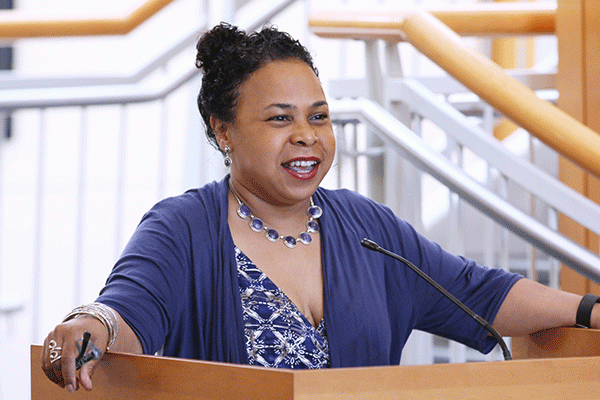
May 25, 2017—With panel discussions, a keynote, and a festive reception, CSWS celebrated the release of Director Michelle McKinley’s book, Fractional Freedoms: Slavery, Intimacy, and Legal Mobilization in Colonial Lima, 1600-1700, at the Knight Law School on the UO campus. The book, published by Cambridge University Press, explores domestic slavery and what Professor McKinley terms “fractional freedoms” in the context of colonial Peru. In addition to running CSWS, Professor McKinley is also the Bernard B. Kliks Associate Professor of Law at the University of Oregon School of Law.
Sponsors: Center for the Study of Women in Society, School of Law, Wayne Morse Center for Law and Politics, Oregon Humanities Center, Division of Equity and Inclusion, the Departments of Ethnic Studies and History, and the CSWS Women of Color Project. This event was part of the 2016 -17 Lorwin Lectureship Series on Civil Rights and Civil Liberties. The Lorwin Lectureship is a bequest of the UO College of Arts and Sciences and UO School of Law.
Photographs by Jack Liu
[nggallery id=34]
The afternoon panel featured:
- Michelle McKinley, Bernard B. Kliks Professor, Associate Professor, UO School of Law, is the director of the Center for the Study of Women in Society. Fractional Freedoms: Slavery, Intimacy, and Legal Mobilization in Colonial Lima, 1600-1700 was published by Cambridge University Press in October 2016. She received the Surrency Prize in 2011 for her article of the same title and completed this book while a fellow in residence at Princeton University’s Program in Law and Public Affairs.
- Carlos Aguirre, professor of history at the University of Oregon, is a social historian specializing in the history of modern Peru and Latin America. He has written extensively about slavery and abolition, the history of crime and punishment, political imprisonment, intellectuals and power, and the history of archives. He is currently working on two book projects, one on Intellectuals and Military Nationalism in Peru (1968-1975) and the other one on printed culture in twentieth-century Peru.
- Larissa Brewer-García, assistant professor of Latin American literature at the University of Chicago, specializes in colonial Latin American studies. Her research interests include the relationship between literature and law, genealogies of race and racism, humanism and Catholicism in the early modern Atlantic, and translation studies. Her current book project, Beyond Babel: Translation and the Making of Blackness in Colonial Spanish America, examines the influence of black interpreters and religious intercessors in the creation and circulation of notions of blackness in the seventeenth century.
- Karen Graubart, associate professor of history at the University of Notre Dame, is the author of With Our Labor and Sweat: Indigenous Women and the Formation of Colonial Society in Peru 1550-1700 (Stanford, 2008), which was awarded the Ligia Parra Jahn Prize for gender studies. Her article in Hispanic American Historical Review, “Learning from the Qadi: The Jurisdiction of Local Rule in the Early Colonial Andes,” won the James Alexander Robertson Prize from the Conference on Latin American History last year.
- Allison Madar, an assistant professor of history at California State University, Chico, is a historian of the early modern British Atlantic world. Her current book project, “A People Between: Servitude and the Law in Eighteenth-Century Virginia,” explores the complex social and legal dynamics negotiated by servants and their masters in a colony dominated by racial slavery.
- Rachel Sarah O’Toole, associate professor of history at the University of California, Irvine, is the author of Bound Lives: Africans, Indians, and the Making of Race in Colonial Peru, which received the 2013 Latin American Studies Association Peru Section Flora Tristán book prize. Her current project, “Uncertain Freedom: Africans beyond the Laws of Slavery in Colonial Peru” was funded by the National Endowment for the Humanities as a 2015-2016 John Carter Brown Library Long-Term Fellowship.
- Brett Rushforth, assistant professor of history at the University of Oregon, is most recently the author of Bonds of Alliance: Indigenous and Atlantic Slaveries in New France. This book was named best book in American social history by the Organization of American Historians, best book on the history of French colonialism by the French colonial historical society, best book on the history of European expansion by the Forum on European Expansion and Global Interaction, and best book in French Cultural Studies.
- Ana María Silva, a PhD candidate in history at the University of Michigan, explores the formation of colonial cultural heritage and its relationships with the history of slavery in the digital history project Colonial Cartagena (colonialcartagena.matrix.msu.edu). Her dissertation, Roots in Stone and Slavery: Permanence, Mobility, and Empire in 17th Century Cartagena de Indias, seeks to explain “rootedness” not only as a metaphor, but as a set of historically-specific practices, and a central feature and outcome of empire.
- Nicole von Germeten, professor of history at Oregon State University, is the author of “Scribal Seductions: Transactional Sex in Mexico City,” due out this year from University of California Press. She studies sexuality, religion, legal history, and gender in Spain and the Iberian empires. Her publications include books and essays on Afro-descended populations in Spanish America, focusing on Catholic brotherhoods and Jesuit proselytization. Her scholarship has also explored transactional sex, honor, the history of emotions, fantasy, fashion, violence, witchcraft, sodomy, suicide, and penitential practices.

